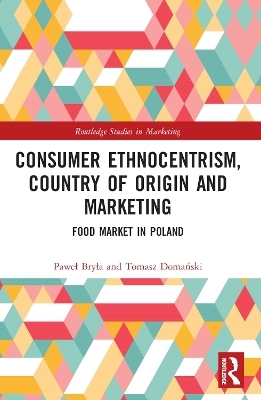
Consumer Ethnocentrism, Country of Origin and Marketing
Routledge (Verlag)
978-1-032-26902-3 (ISBN)
Country of origin and consumer ethnocentrism are evolving constructs as consumers’ perception of country, state, or region changes over time. Understanding consumer motivations and attitudes towards a country and its products can provide valuable insights for marketing strategies.
This book explores the phenomena of consumer ethnocentrism and country-of-origin effect on the food market using examples from Polish retailers. The book aims to determine how appeals to the domestic or foreign country-of-origin provided through claims, symbols, labels, and quality signs can affect consumer attitudes and food purchase intentions as well as to contextualise consumer behaviour issues in the broader picture of the entire system of food production and distribution. The reader will gain a comprehensive understanding of consumer ethnocentrism and country-of-origin effect on the food market based on a series of original research studies conducted in Poland. The combination of quantitative and qualitative research methods provides novel and valuable insights into the phenomena under study.
Based on original research, this innovative volume will be a valuable resource for consumer behaviour, food marketing, and international marketing scholars and students.
Paweł Bryła is Associate Professor at the Department of International Marketing and Retailing, Faculty of International and Political Studies, University of Lodz, Poland. His research interests revolve around consumer behaviour in the food market and food marketing as well as international student mobility. He has led two research projects funded by the National Science Centre, two research projects funded by the Polish Ministry of Science and Higher Education within the Iuventus Plus programme, and headed the Polish team in an international research project: MERGE, funded by the European Commission. He has authored over 120 publications, including articles in such journals as: Nutrients, Appetite, British Food Journal, Sustainability, and Quality Assurance and Safety of Crops & Foods. He has edited two books in English, coordinating international teams of authors. He is an editorial board member of international journals, including: Foods, Sustainability, European Journal of International Management, Central European Management Journal, and Economia Agro-Alimentare. In Google Scholar, he has 1575 citations, with the Hirsch index of 19. Tomasz Domański is Full Professor and Director of the Department of International Marketing and Retailing, University of Lodz, Poland, and Director of a Polish-French MBA programme. He also served as Dean of the Faculty of International and Political Studies, and as the President of the Committee of Academic Policy advising the Polish Minister of Science and Higher Education. His research interests include marketing strategies of distribution chains, food marketing, place marketing, and university internationalisation. He has been involved in numerous national and international research and education projects, and has authored and co-authored over 180 academic publications, including 20 books, in Poland and abroad. He was the local coordinator of the CampusCulturae project in the framework of the EU Culture programme. He was the supervisor of 12 successful doctoral dissertations in management. Since 1990, he has been a marketing consultant for numerous renowned Polish and foreign businesses.
List of figures
List of tables
Acknowledgments
1. Introduction
Part I. Consumer ethnocentrism and country-of-origin effect on the food market – quantitative results from Poland
2. Consumer ethnocentrism and country-of-origin effect on the food market – a survey among Polish consumers
Paweł Bryła
3. Consumer ethnocentrism and country-of-origin effect on the food market – a survey in the food marketing channel
Paweł Bryła
4. Consumer ethnocentrism and country-of origin effect on the food market -verification of hypotheses
Paweł Bryła
Part II. Case studies of marketing strategies appealing to consumer ethnocentrism or country-of-origin effect
5. Biedronka: How to create a Polish image of a foreign discount chain
Tomasz Domański
6. Grot: A case study of a family company operating in the market of traditional meat products
Tomasz Domański
7. A case study of an organic dairy plant – EkoŁukta: How to elicit consumer ethnocentrism based on the regional origin of an organic product
Tomasz Domański
8. Klimeko: a case study of a family company operating on the dairy market
Tomasz Domański
9. Srebrna Góra Vineyard: How to build a Polish wine brand
Tomasz Domański
10. Conclusion with managerial implications
Tomasz Domański and Paweł Bryła
Appendix 1. Survey questionnaire addressed to consumers
Paweł Bryła
Appendix 2. Survey questionnaire addressed to companies
Paweł Bryła
Appendix 3. Guide for interviews with managers
Paweł Bryła
Index
| Erscheinungsdatum | 05.09.2022 |
|---|---|
| Reihe/Serie | Routledge Studies in Marketing |
| Zusatzinfo | 115 Tables, black and white; 30 Line drawings, black and white; 30 Halftones, black and white; 60 Illustrations, black and white |
| Verlagsort | London |
| Sprache | englisch |
| Maße | 156 x 234 mm |
| Gewicht | 453 g |
| Themenwelt | Studium ► Querschnittsbereiche ► Infektiologie / Immunologie |
| Naturwissenschaften ► Biologie ► Biochemie | |
| Naturwissenschaften ► Biologie ► Genetik / Molekularbiologie | |
| Wirtschaft ► Betriebswirtschaft / Management ► Marketing / Vertrieb | |
| Wirtschaft ► Volkswirtschaftslehre | |
| ISBN-10 | 1-032-26902-2 / 1032269022 |
| ISBN-13 | 978-1-032-26902-3 / 9781032269023 |
| Zustand | Neuware |
| Informationen gemäß Produktsicherheitsverordnung (GPSR) | |
| Haben Sie eine Frage zum Produkt? |
aus dem Bereich


